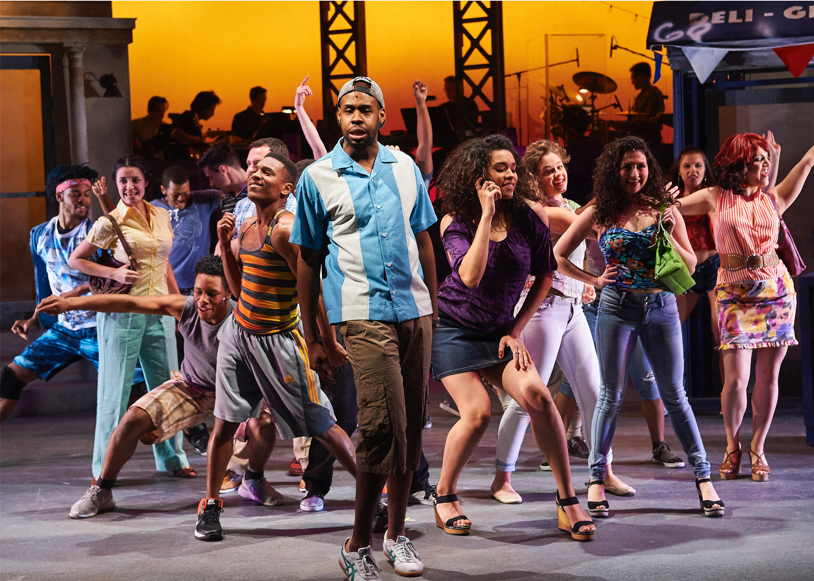
The universe works in mysterious ways… Last night, for the first time, I actually felt sorry for Donald Trump. It happened at a performance of Lin-Manuel Miranda’s In the Heights at the Seattle Repertory Theater. Miranda’s hip hop/rap/salsa/merengue musical chronicles the lives of a group of Latinx immigrants full of hope and aspiration in the Washington Heights neighborhood at the northern tip of Manhattan. Some are first generation, some second, but they found their way to the Heights from all over Latin America – Cuba, Mexico, Dominican Republic, Haiti, and Puerto Rico – in search of a better life. What they find there, in the tenements and steamy summer heat of Upper Manhattan, is community and a shared humanity.
So, what caused my mind shift last night? It’s complicated. I’d been working on an article about the current border crisis but couldn’t figure out how to talk about it without dipping into typical liberal-speak about fear, racial bias, or the tired entreaties of “Give me your tired, your poor, your huddled masses yearning to breathe free.” But, last night, the music and energy of In the Heights gave me the positive image I was looking for – hard working immigrants surging with energy, hope, and a devotion to community wanting to make a better life for themselves and their families. Yes, it’s a musical fiction. Yes, it’s riding the wave and enormous success of Miranda’s Hamilton. But, like all good art, its power comes from the emotion it releases in us and the truth it conveys.
I feel sorry for Donald Trump because he doesn’t know that joy of community. His body language tells us he’s never felt the liberating power of dance and music. His words and actions tell us he doesn’t understand or appreciate the value of artistic expression. As president, he has rejected two invitations to attend the Kennedy Center Honors, created to recognize “exceptional artists who have made enduring and indelible marks on our culture.” Nor has he invited a single artist to perform at the White House. Who can forget the Pablo Casals performance at the Kennedy White House, Bill Clinton playing the sax on the Arsenio Hall Show, or Lin-Manuel previewing the first song of Hamilton for the Obamas and friends when it was just being written? Trump’s ignorance and myopia prevent him from enjoying or acknowledging the contributions of the many diverse communities – Jewish, Hispanic, African-American, Irish, Italian, Polish, Arab, Asian – that make up the American experience. I feel sorry for him but I don’t forgive him for what he’s done to our culture and reputation.
In Trump’s America, walking on eggshells is easier than finding common ground for a discussion of immigration policy. I confess, I can’t wrap my head around the “why” of it, but his incendiary midterm election rhetoric and a fearful, lethargic Congress are keeping us from having a meaningful dialogue and finding a solution to the immigration “problem.”
At its core, the “problem” is difficult only because opposing camps have been unwilling to sit down and wrestle with the details. If we want to find a solution, both sides need to tamp down of the rhetoric, approach the discussion in good faith, summon our capacity for compassion, and be willing to compromise. At its simplest, it will require capital – human and financial – along with acceptance of the fact that war, anarchy, gang violence and corruption underlie the soaring number of immigrants surging along our southern border.
This is not normal, nor is it just an American problem…it’s worldwide. Africa, the Middle East, Asia, and the Americas are all experiencing unprecedented flows of refugee and migrant populations. In the Americas, that influx is putting immense pressure on the people and systems that protect our southern border. Refugees and migrants fleeing the danger in Honduras, Guatemala, and El Salvador are increasing the stress at American border crossings.
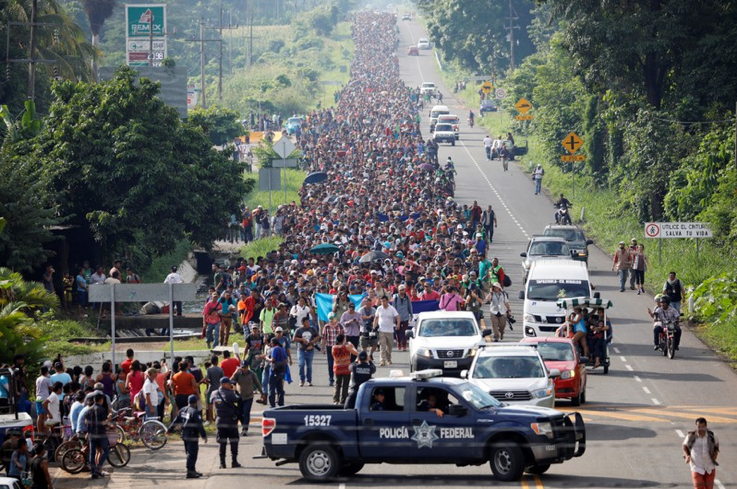
To be clear, the migrants and refugees swarming toward us now are exceptions to normal immigration. Depending on who’s speaking these are “undocumented immigrants,” “illegal aliens,” “economic migrants,” or “bad people.” Each appellation has a layered connotation, but regardless of your political leanings, telling tens of thousands of people that they need to apply for admission to the United States through established procedural channels is an avoidance strategy not a solution. The current administration has its head in the sand if it thinks this mass movement is going to sit on its hands in Tijuana for 10 years in order to be considered for possible inclusion in normal visa flows.
Why isn’t Congress’ addressing the crisis? Lancing this festering boil on our southern border should be their number one priority. Until a solution is crafted the entire US government will be stalled. Can a divided Congress find the will to address it? We’re suffering and divided and will continue to be until it does. There are no simple solutions. It’s difficult but not impossible. In 2013 the US Senate passed the Border Security, Economic Opportunity, and Immigration Modernization Act, a bipartisan bill introduced and co-sponsored by the Gang of Eight (4 leading Republicans and 4 leading Democrats). Hearings were held, markups made, and on June 27, 2013 the Senate passed the bill with a vote of 68 to 32.
The bill provided “illegal immigrants” who resided in the US prior to December 31, 2011 a path to citizenship pending the payment of a fine, back taxes, and passing a background check without a criminal record. It also gave the children of illegal immigrants, the so-called “Dreamers,” permanent resident (Green Card) status. It beefed up the border fence and increased the number of US Customs and Border Protection agents and introduced a “merit-based visa system” to deal with future legal immigration.
Despite bipartisan Senate passage, the House of Representatives under Speaker John Boehner refused to bring the bill to a vote. It died on the floor of the House. Today, the problem still exists, and we are further from a solution than we were in 2013.
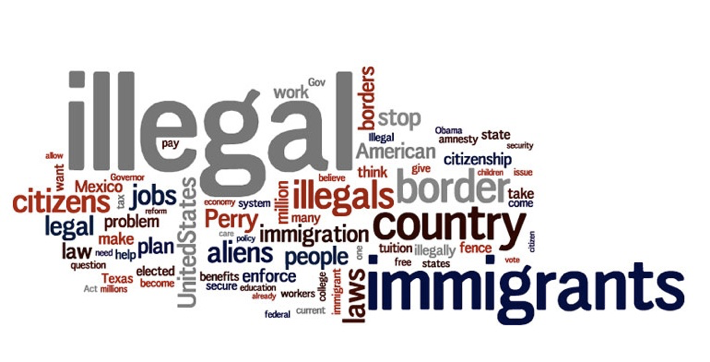
Some Americans, fueled by Trump’s inflammatory rhetoric, see a threatening invasion of Central Americans on our southern border, but immigration is not just an American problem. In the UK, hard feelings and divisions over immigration forced a vote that resulted in Britain’s departure from the European Union. Similarly, European countries dealing with an unprecedented wave of refugees from war torn Middle Eastern and North African countries are straining to find resources and struggling to assimilate diverse populations. In Myanmar, Rohingya natives fleeing genocide are relocating to an unwelcoming Bangladesh. The underlying causes of these problems are many, but their geographic distribution makes it clear that immigration is not, as Donald Trump wants us to believe, primarily an American phenomenon.
Most countries, including America, have a system in place to process migrants that establishes the number and categories of immigrants it will accept annually. The American system is not perfect but it has been an orderly way to evaluate and vet people wanting to relocate to the United States.
The migrants on our southern border do not fit into our normal system for the orderly processing of applicants. The world is no longer orderly, if it ever was, and extreme events such as drought, famine, civil war, and despotic governments, death squads and terrorism are driving populations from their homes in search of safer places to live. These extremes underlie the sudden and desperate relocation of huge numbers of people. The “system” was never intended to address or manage large disorderly populations like the ones we’re seeing today. These groups, whether they are Syrians seeking refuge in Germany or Hondurans fleeing drug violence for a safe haven in America, do not have time to wait the eleven years it takes to go through the systematic visa vetting process. They are terrified, and their plight is urgent.
All of these “extra” immigrant populations are “undocumented,” meaning they do not have the required documents to immigrate legally. Most are hoping to be granted asylum status and be admitted on the basis of threats to their welfare. So, how do we approach a solution to this extraordinary situation?
Historian Jon Meacham’s most recent book, The Soul of America: The Battle for Our Better Angels asks us to consider how we got into this polarized, gridlocked political stalemate and appeals to “our better angels” to lead us out of it. Where is our compassion? What kind of government tells migrants the only way to asylum is through an official port of entry and then blocks access to that crossing? What perversion leads this same government, our government, to limit asylum interviews to a handful each day while thousands are told they have to wait their turn. Where is the “can do” spirit that can put a man on the moon but can’t process asylum applications for people who have walked more than 1000 miles seeking safety? What kind of a president sends an armed military to an international border as a pre-election stunt when border law officers are adequate for enforcement? What kind of government uses tear gas against women and children whose only sin is frustration with a broken system only ask for a safe place to live.
According to best estimates, there are about 11 million undocumented immigrants living in America. They mow our lawns, make our beds, wash our dishes, and clean our houses. That’s 3.66% of the US population. Estimates are that 3.6 million of the 11 million are “DREAMers,” children brought to the US by their parents and given a special status by President Obama. Because Congress hasn’t solved the problem there are now roughly 4000 migrants at or near the US-Mexico border. On Sunday, ICE closed the border and used tear gas to push the crowd on the opposite side of the border back.
Referring to In the Heights, Braden Abraham, Artistic Director of the Seattle Rep wrote
“I’m struck by how this (2008) groundbreaking work resonates differently now and more broadly than ever. A lot has happened over the last decade, from the Great Financial Crisis, to Lin-Manuel transforming musical theater with is monumental Hamilton, to the emergence of immigration as the toxic centerpiece of our politics. As incendiary as this is, the first may be the better clue to In the Heights increased relevance. The questions Lin-Manuel’s Upper Manhattan Latinx community wrestles with—what it means to have roots, a community, or a home; whether to stay in a pace or leave or if one even has a choice in the face of economic inequality and gentrification; whether the American Dream can still be achieved—are increasingly being asked by people and communities, both immigrant and no-immigrant, throughout our country.
I continue to believe that the arts can reach us and teach us things we need to know about ourselves, each other, and the world. It’s unrealistic to think that Donald Trump will be changed by something as energetic and moving as In the Heights, but it can remind us of the real America and give voice to those of us who feel we have lost ours in the last two years.
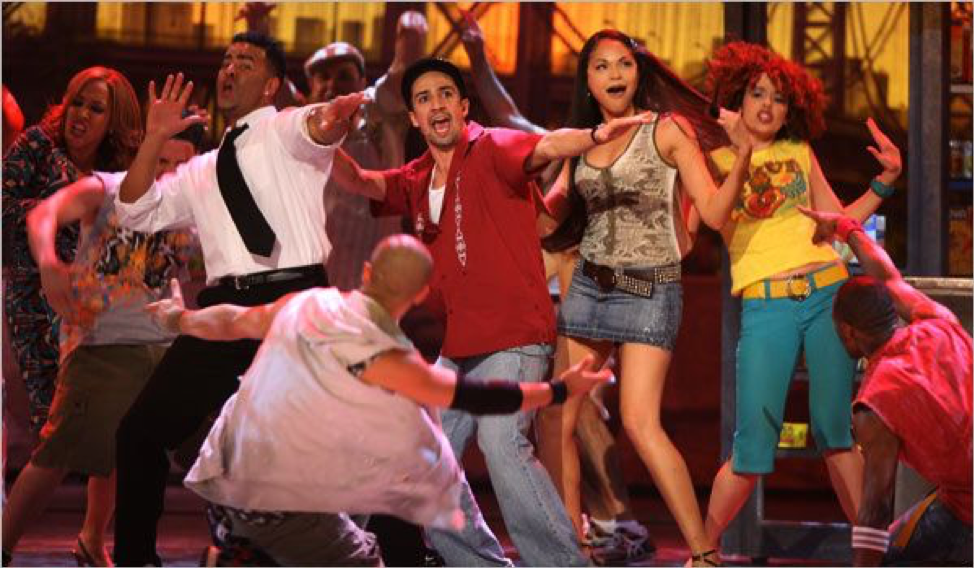































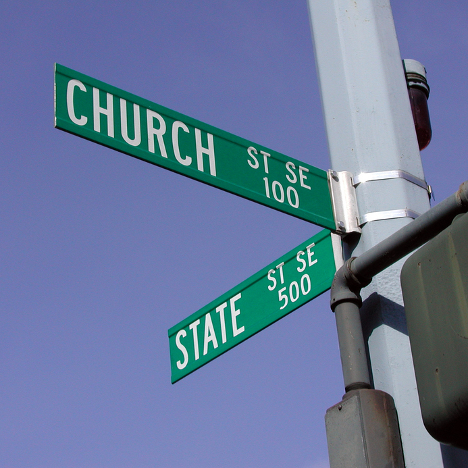
Good article! Keep it up. Gary
Jack, a most comprehensive and articulate article. Nevertheless, I cannot feel sorry for anyone that collects all the negatives of a problem to use against fixing that problem. The use of hate, racism and a total lack of empathy to secure votes and further the worst aspects of humanity is calculated and against all values the USA stands for hence my lack of sympathy for a man who purposefully narrows his world view to one that is so reprehensible. He’s simply not deserving to share the same world with others.